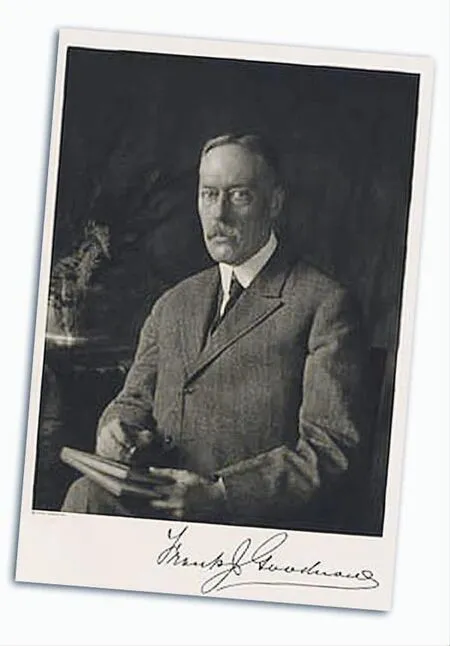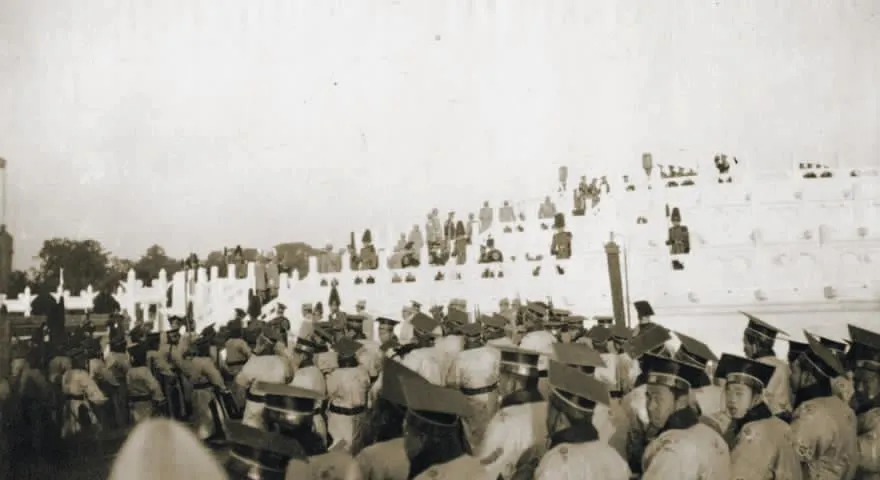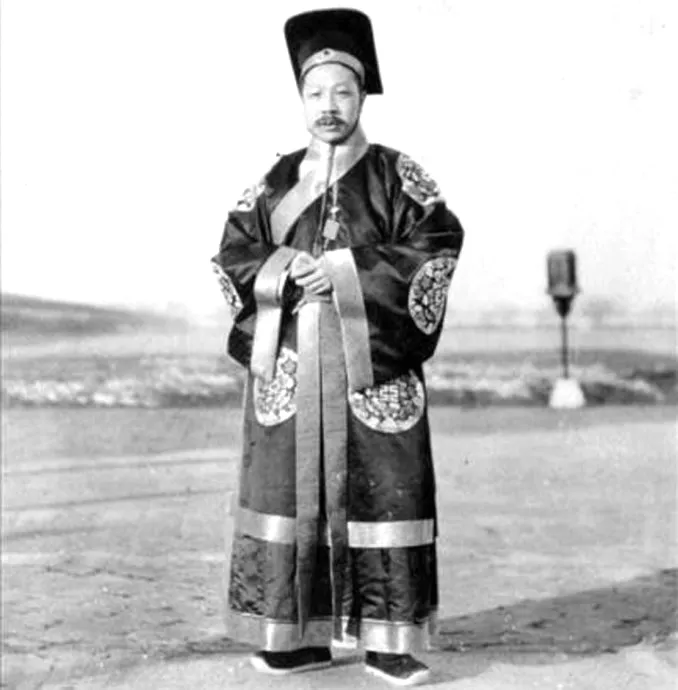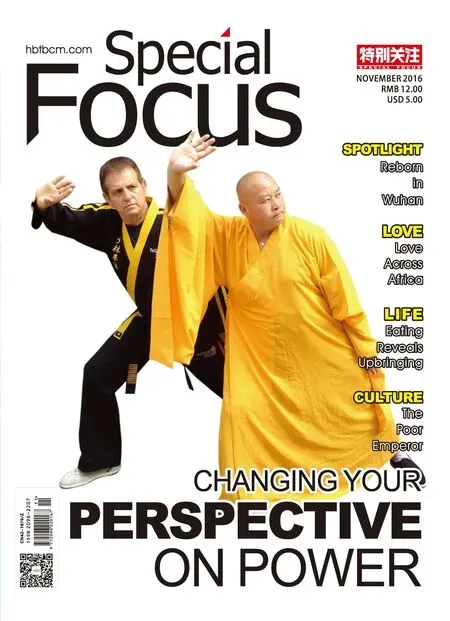The Foreign Expert Defamed by an Epoch
By Zhao Wei
The Foreign Expert Defamed by an Epoch
By Zhao Wei

Talented people can be created or sometimes tarnished by the instability of the era in which they are born.In China’s modern history,a high-level foreign expert,and profoundly learned scholar was recommended to the Yuan Shikai government of the fledgling Republic of China,but unfortunately ended up being a political victim of that bizarre and tumultuous era.
B ack in the early Republican Era of China a century ago, the Republic of China had just been founded.All manner of political forces were competing for the power to decide what path China should follow,which resulted in an unstable political arena.At that time,an internationally famous scholar—Professor Frank Johnson Goodnow1(1859-1939)recommended by the Carnegie Foundation, came to China to help with legislative work.
Goodnow was far more than an ordinary man.He was a man of exceptional moral fortitude,and well deserved to be called a leading authority of the time.He once worked as the dean of the Columbia Law School,and was the founder of the American Political Science Association and the authority on political science and administrative law in his day.Initially,he was under a three-year contract with the government of the Republic of China to aid them in drafting a new constitution.Who would have imagined that he could be offered the position of president of Johns Hopkins University after only a year of service in China?Undoubtedly,Professor Goodnow more favored his position at the University.He went back to the United States to take up his new post as a university president,while remaining the nominal consultant for the Chinese government.He even took advantage of school holidays to return to China and work for a few weeks.
By today’s standards,he was a bona fide high-level“foreign expert.”He had an enormous annual salary of 25,000 silver dollars, tax-free.In addition,he was lavished with horse-driven carriages, assistants,bodyguards and servants. He was exceptionally well paid even by today’s standards.His employer was the government of the Republic of China that had just undergone Xinhai Revolution2and not yet stabilized.But at that time, Yuan Shikai3had already seized the office of President of the Republic of China,and was planning to restore the monarchy and ascend to the throne.
After Goodnow was employed to work in China,he based the political design for the newly founded Republic of China on the conditions of the United States during the time of the Civil War,to which he compared China.Thus,he advocated for the reinforcement of the president’s administrative power and the restraining of the legislative power of parliament,based on his study of the American political system.He also wrote an article,approximately 10,000 words long,as his personal suggestion to Yuan Shikai,from the standpoint that,“Monarchy is superior to republicanism.”This article was immediately translated into Chinese,titled“Monarchy and Republicanism,”and disseminated far and wide.
Any article written from an academic point of view,was essentially beyond reproach,as long as it was well-founded and made sense. Moreover,Goodnow’s article extolling the virtues of the autocratic system,did not go beyond the scope of the constitutional monarchy system that was adopted by many Eurasian countries of the day,such as Britain and Japan.However,his academic outlook was instantly favored by Yuan Shikai,who had attempted to proclaim himself the emperor,and was taken as the theoretical basis for the revival of the monarchy.Therefore,Goodnow was regarded as the“devil’s apologist”for Yuan Shikai.
Afterwards,Yuan Shikai took a series of actions aimed at turning back the hands of a clock that beat out a reactionary rhythm with the tick of each passing second.In Yuan’s ascent to the throne,Goodnow played the role of a naive foreign scholar—an ignorant pawn to be used by the emperor to achieve his dictatorial aims.
Ultimately,Yuan’s bid to restore monarchy in China failed,which left his reputation forever scarred and Goodnow’s good name stigmatized.Whether or not Goodnow could have written such an article laced with unscholarly overtones under the influence of bribery has been the subject of much scrutiny.


Enthronement of Yuan Shikai
In fact,Goodnow was a decent scholar,who would not contravene academic ethics.He came to China for the first time and was utterly ignorant about its chaotic political climate that was at best a free for all, at worst a mad power grab for soulless despots.Thus he was dragged into the complex political web while being kept in the dark all along.And though he was only a scapegoat,posterity has found it hard to see him any vindication.
There is always such an interaction between an era and talented individuals.The backdrop of a particular era can help you achieve fame and further your career.But it can sometimes be deceptive and bring you shame and ignominy.It can set you up for the fall just when you are most prideful.However,no matter whether an era is good or not,you have to live in it,so the key lies in seeking the appropriate balance.
Professor Goodnow’s misfortune in China shows that even for a decent man,he who associates with those who toy with the zeitgest of the times,will suffer sooner or later. Furthermore,knowledge will not automatically transform itself into righteousness.Under the influence of the wrong individuals,knowledge can be turned into a candle for the devil,as proven by numerous cases all over the world and throughout time immemorial.
(FromInternational Talent,January 2016.Translation:Zhu Yaguang.)
Note:
1.Frank Johnson Goodnow,Ph.D., LL.B.(1859-1939)was an American educator and legal scholar,born in Brooklyn,New York.
2.The Xinhai Revolution,also known as the Revolution of 1911, or the Chinese Revolution,was a revolution that overthrew China’s last imperial dynasty(the Qing Dynasty),and established the Republic of China.The revolution was named Xinhai(Hsin-hai)because it occurred in 1911,the year of the Xinhai stem-branch in the sexagenary cycle of the Chinese calendar.
3.Yuan Shikai(1859-1916)was a Chinese general,politician and Emperor,famous for his influence during the late Qing Dynasty,his role in the events leading up to the abdication of the last Qing Emperor,his autocratic rule as the first formal President of the Republic of China, and his short-lived attempt to restore monarchy in China,with himself as the Hongxian Emperor.

Yuan Shikai,the Hongxian Emperor

